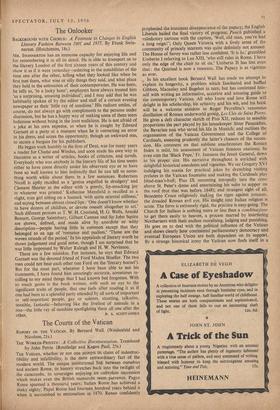BACKGROUND WITH CHORUS: A Footnote to Changes in English Literary
Fashion Between 1901 and 1917. By Frank Swin- nerton. (Hutchinson, 18s.) MR. SWINNERTON has an immense capacity for enjoying life and for remembering it in all its detail. He is able to transport us to the literary London of the first sixteen years of this century and show it as if it were yesterday—ushering in the notabilities of the time one after the other, telling what they looked like when he first met them, what wise or silly things they said, and what place they held in the estimation of their contemporaries. He was born, he tells us, 'in a lucky hour'; employers have always treated him 'as a surprising, amusing individual'; and 1 may add that he was habitually spoken of by the editor and staff of a certain evening newspaper as their 'little ray of sunshine.' His radiant smiles, of course, do not always go with compliments to the persons under discussion, but he has a happy way of making some of them seem ludicrous without being in the least malicious. He is not afraid of a joke at his own expense, as when he is caught by Edward Garnett at a party at a moment when he is correcting an error in his dress, and seizes the opportunity, though an awkward one, to secure a bargain for his publisherS.
He began work humbly in the firm of Dent, was for many years a reader for Chatto and Windus, and soon made his own way in literature as a writer of articles, books of criticism, and novels. Everybody who was anybody in the literary life of his time seems either to have come directly under his observant eye or to have been so well known to him indirectly that he can tell us some- thing worth while about them in a few sentences. Robertson Nicoll is aptly recalled as a 'genius engulfed in drudgery' and Clement Shorter as the editor with 'a greedy, lip-smacking joy in whatever was printed.' Katherine Mansfield is recalled as a slight, trim girl sitting on a hassock 'with quite oriental stillness,' and saying between almost closed lips: 'One doesn't know whether to have dozens of children, or devote oneself altogether to art.' Such different persons as T. W. H. Crosland, H. G. Wells, Arnold Bennett, George Saintsbury, Gilbert Cannan and Sir John Squire are shown, defined, and made alive by anecdote or witty description—people having little in common except that they belonged to an age of 'romance and realism.' Those are the woven strands of the period.' In his appraisals of literary worth he shows judgement and good sense, though I am surprised that he was little impressed by Walter Raleigh and H. W. Nevinson.
There are a few mistakes. For instance, he says that Edward Garnett was the devoted friend of Ford Madox Hueffer. The two men could not bear each other (see Ford on the 'literary hornet'). But for the most part, wherever I have been able to test his statements, I have found him amazingly accurate, sometimes re- calling to my mind things that I had known but forgotten. With so much gusto is the book written, with such an eye to the significant traits of people, that one feels after reading it as if one had been to a splendid party attended by all sorts of important or self-important people, gay or solemn, strutting, talkative, sensible, fantastic—behaving like the liveliest of animals in a zoo—the little ray of sunshine spotlighting them all one after the


































 Previous page
Previous page